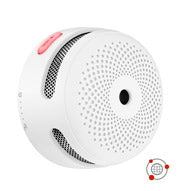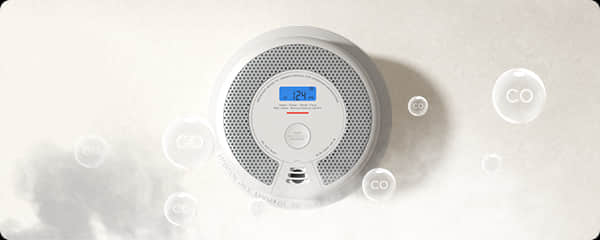How to Stop False Smoke Alarms
Mon, Apr 26, 2021
A false alarm from smoke detectors is a common occurrence in most homes. However, this should not deprive you of peace at home. Most of the false alarms are due to environmental conditions, installation in the wrong places and electrical outages.
In this article, we shall focus on the prevention of false alarms as well as stopping them in case they occur.
How to Silence and Troubleshoot a False Smoke Alarm
False alarms are not only scary but also infuriating. In worse case scenarios, they are a nuisance. However, as a homeowner, you are in control of your detectors and the false alarms can be prevented. Below are simple steps and tips to help you prevent your smoke alarm from false triggers.
Step 1: Silence the alarm
First, you will have to silence your alarm before you run diagnostics of what triggered the false alarm. You should press-hold the silence or test button on the interface of your smoke detector to silence it. After the detector is silent find out the cause and take the necessary measures to prevent the same from happening again.
Step 2:Review the following fixes
The steps involved in fixing a false alarm will depend on the exact cause. Some of them may be dust in the chamber, shower steam, nearing expiry dates, among others.
Ask yourself some of the questions below to enable you in reviewing the cause of false alarms in your smoke detectors.
1. What was the initial installation date?
The initial date or rather the date of manufacture is important in ruling out if the alarm was triggered by an expiring smoke alarm. The life span of most smoke detectors is between 7 and 10 years. If your detector is that old, consider replacing it with a new one. To check the expiry dates, remove the detector from its position and check the expiry date at the back.
2. Does the unit need cleaning?
Accumulation of dust in the chambers of detectors can trigger false alarms. This mostly occurs in newly built homes. Gently vacuum clean the detector with the smooth brush attachment from time to time.
3. How close or far is the unit from vents, steam sources, lights, fans or direct sunlight?
The closeness of your smoke detector to vents, fireplaces, and other locations are likely to trigger false alarms. Ensure your smoke alarm is installed in accordance to the placement guidelines.
4. In the recent past, have you experienced power outages?
Hardwired smoke detectors may sound alarms due to power interruptions. Such cases are common in areas where power companies switch the grid during morning hours. Loose hot wire connections may also trigger false alarms because they are similar to power outages. In such cases, the services of a skilled electrician will save you the trouble from nuisance alarms.
5. Is there a malfunction in the alarm?
In case your diagnostics rule out all the other possible causes, your detector may have a malfunction. When that is the case, you can call the detector’s company representative to accord you assistance with your detector.
6. If your detectors are battery-powered, is the connection over junction boxes?
If your battery-powered smoke detector is installed over a junction box then this is likely the cause of the false alarm. Relocate the alarm to prevent the trigger of false alarms.
The Reasons of Causes of False Smoke Alarms
Besides asking yourself, the above questions there are other conditions that may trigger false alarms.
1. HVAC vents
Smoke alarms installed in vents where cool air returns are prone to false alarms. The main cause of the false alarms is due to the dusty air blown into the sensing chamber of the smoke detector.
2. Dust on the cover or in the chamber of the sensor
A dusty cover and sensor chamber is a common trigger of false alarms. This in most cases happens in newly built homes.
3. High humidity
High humidity areas like showers and laundry areas make smoke alarms susceptible to false alarms.
4. Overloading the alarm’s circuits with large appliances
Large current loads in the same circuits with smoke detectors in many cases causes nuisance alarms.
5. Direct sunlight to the detector
Bright light shining directly into photoelectric detectors interferes with their operation, which triggers false alarms. When that is the case, consider relocating the detector to a different location.
6. First time heating in new homes
When heating a new home for the first time dirt, dust and oil residues on the metallic parts of the new heater can trigger alarms in smoke detectors. The smoke generated from oil residues and dust from the debris is the main causes of the false alarms.
7. Triggers from other alarms due to interconnection
A smoke detector in an interconnected system triggers alarms in all other units in the connection. Such connections are designed to sound alarms in other rooms to enable ample time for evacuation.
8. Presence of insects
The presence of insects like spiders in the sensor chamber of smoke detectors can trigger false alarms. Vacuum clean regularly to get rid of the insects and hence prevent occurrence of false alarms.
Best Way to Replace Your Smoke Alarm
If the false alarm in your smoke alarm persists, then you have no option but relocate its position.
Below are some useful steps for placement in a new position to solve the alarms nuisance.
- The least distance from ovens and heaters should be 20 feet.
Because ovens and heaters produce, combustible particles place your smoke detector 20 feet away. However, in rooms or smaller homes where the recommended distance is not possible ensure you install the detector as far away as possible.
- In high humidity areas, you should install the smoke detector ten feet away. High humidity areas include showers, bathrooms and laundry areas.
- The recommended least distance from vents, light fixtures, and vents is 3 feet away.
In conclusion, to effectively deal with false alarms you have to know the causes and conditions that trigger them. Some of the factors and conditions mentioned above are preventable by adjusting the conditions, relocating the detectors and in some instances replacing it.

X-Sense XS01-WR Wireless Smoke Detector
- Wireless technology uses radio frequency to transmit and receive messages.
- If one alarm goes off, the rest of the interconnected alarms will alert as well.
- 5-year replaceable battery and 10-year sensor life.
- Advanced photoelectric sensor is more sensitive and reduces false alarms.
$29.99











